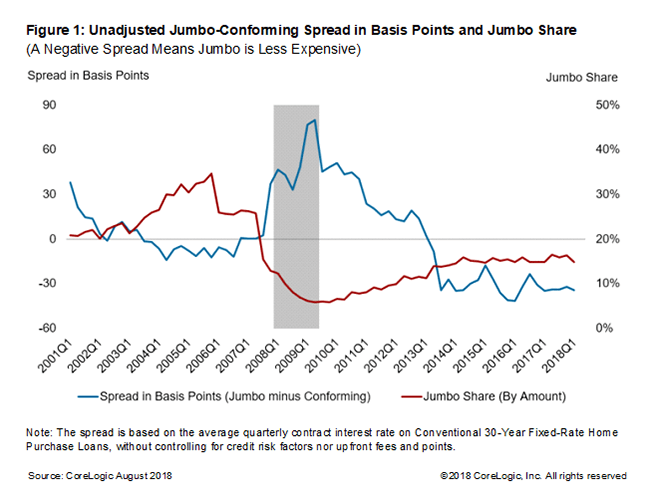Jumbo Loan: Affordable Prices and Flexible Terms for Pricey Properties
Jumbo Loan: Affordable Prices and Flexible Terms for Pricey Properties
Blog Article
The Effect of Jumbo Financings on Your Financing Choices: What You Required to Know Prior To Applying
Jumbo car loans can play a critical role in forming your financing alternatives, especially when it comes to obtaining high-value properties. Recognizing the equilibrium between the advantages and obstacles positioned by these finances is essential for possible debtors.
Recognizing Jumbo Finances
Comprehending Jumbo Loans requires a clear grasp of their special characteristics and requirements. Jumbo financings are a type of home loan that surpasses the conforming finance limitations established by the Federal Housing Financing Firm (FHFA) These limitations differ by place however commonly cap at $647,200 in many locations, making big lendings important for funding higher-priced buildings.
One of the specifying functions of jumbo fundings is that they are not eligible for purchase by Fannie Mae or Freddie Mac, which brings about stricter underwriting standards. Customers need to usually show a greater credit report, typically over 700, and offer significant paperwork of earnings and possessions. Additionally, lenders may call for a larger deposit-- frequently 20% or even more-- to reduce risk.
Passion rates on big financings can be slightly more than those for conforming lendings due to the raised danger assumed by the lender. The lack of exclusive home mortgage insurance coverage (PMI) can balance out some of these prices. Recognizing these aspects is important for possible debtors, as they significantly influence the terms and usefulness of securing a jumbo funding in today's competitive real estate market.
Advantages of Jumbo Loans
Jumbo finances offer distinct benefits for homebuyers seeking to acquire high-value residential or commercial properties that exceed conventional funding limitations. One of the key advantages of big loans is their capability to finance bigger amounts, permitting customers to acquire homes in premium markets without the restraints enforced by adjusting financing restrictions - jumbo loan. This adaptability makes it possible for homebuyers to check out a more comprehensive array of residential or commercial properties that might better suit their needs and preferences
Furthermore, jumbo car loans typically include competitive rate of interest, especially for debtors with solid credit accounts. This can lead to significant financial savings over the life of the lending, making homeownership much more budget-friendly over time. Additionally, jumbo car loans can be tailored to suit specific financial scenarios, offering numerous terms and amortization options that line up with the consumer's goals.

Difficulties of Jumbo Lendings
Navigating the intricacies of jumbo car loans provides a number of difficulties that potential customers need to know prior to continuing. One considerable difficulty is the rigid borrowing requirements imposed by banks. Unlike conforming financings, jumbo lendings are not backed by government-sponsored business, leading loan providers to take on even more extensive standards. This typically includes greater credit over at this website rating requirements and significant documents to verify income and possessions (jumbo loan).
In addition, jumbo loans commonly include greater rate of interest rates compared to conventional loans. This raised expense can dramatically influence regular monthly payments and total price, making it vital for borrowers to meticulously analyze their economic circumstance. The down settlement demands for jumbo lendings can be considerable, typically ranging from 10% to 20% or even more, which can be a barrier for numerous potential property owners.
One more challenge hinges on the minimal accessibility of jumbo financing items, as not all lending institutions supply them. This can result in a decreased pool of options, making it critical for borrowers to carry out extensive study and possibly seek specialized loan providers. On the whole, recognizing these challenges is crucial for anyone thinking about a big financing, as it ensures informed decision-making and far better economic planning.
Certification Criteria
For those taking into consideration a jumbo loan, satisfying the certification standards is an important action in the application procedure. Unlike standard lendings, jumbo fundings are not backed by federal government companies, leading to more stringent demands.
Firstly, a solid credit history score is necessary; most lenders call for a minimum rating of 700. In addition, borrowers are normally anticipated to demonstrate a considerable earnings to ensure they can easily take care of their explanation higher monthly settlements.
Deposit needs for big finances are additionally considerable. Consumers should anticipate putting down at least 20% of the property's purchase cost, although some loan providers may use choices as low as 10%. Demonstrating money reserves is vital; lenders frequently require evidence of enough liquid assets to cover several months' well worth of home loan payments.
Comparing Funding Choices
When evaluating financing options for high-value residential or commercial properties, recognizing the differences in between different loan kinds is necessary. Big car loans, which surpass adapting funding limits, normally included stricter credentials and higher rate of interest than conventional lendings. These car loans are not backed by government-sponsored ventures, which increases the lending institution's danger and can bring about more rigorous underwriting criteria.
On the other hand, traditional loans provide more flexibility and are typically much easier to acquire for borrowers with solid credit profiles. They might feature lower rate of interest rates and a wider range of options, such as repaired or adjustable-rate mortgages. Additionally, government-backed loans, like FHA or VA loans, provide chances for lower deposits and even more lenient debt needs, though they additionally impose limitations on the financing quantities.

Conclusion
In final thought, big financings existing both chances and difficulties for prospective property buyers looking official source for funding for high-value properties. While these car loans allow for larger amounts without the problem of private home mortgage insurance policy, they include strict qualification demands and potential disadvantages such as higher rates of interest. An extensive understanding of the advantages and difficulties related to big loans is crucial for making notified choices that line up with long-lasting economic objectives and goals in the property market.

Report this page